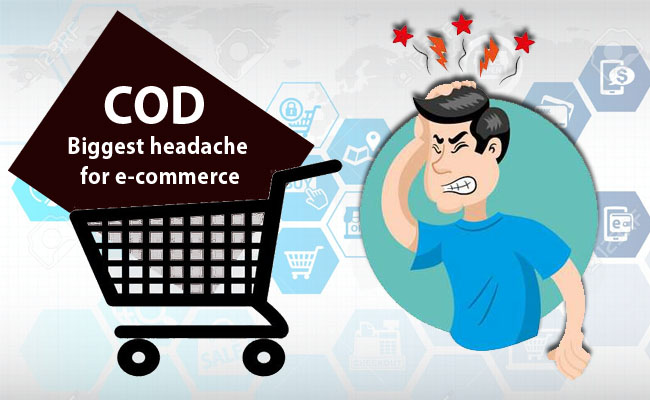COD is the biggest headache for e-commerce giants
By MYBRANDBOOK

The banking and e-commerce sectors has witnessed a huge metamorphosis over the past few years, thanks to emerging technology. 2019 is predicted to be one of the biggest changes for the sectors and thanks to AI and digital currencies. Many banks are shifting to AI technology and big data, which will completely transform banking as we know it. Risk management and fraud prevention will become much more secure thanks to AI and more.
A slew of factors are set to change the business landscape over the next few decades. AI, social media, globalization, and other developments have introduced risks that CEOs, business owners, or anyone responsible for business continuity must grapple with. One must learn on how to protect your assets, people, and valuation from risks introduced by globalization and emerging technologies such as autonomous vehicles. Generally, about 35% of online sales are triggered due to offers/promotions and discounts.
The cash on delivery mechanism (COD) customers are the ones who may not know how to use a card/online payment options. One can try paying through Debit card or net banking of any reputed bank, and there are generally 3-4 steps(almost each one of them requiring a separate verification method) required to make a successful payment.
For many customers who are technically challenged, it can be quite confusing. Not to mention internet connectivity issues which do lead to transaction failures.
Ideally, deferral payment basis, the fact was there should be some checks and balances to prevent any such misuse. That is possible only when a portion of the bill is prepaid to at least cover the shipping expenses incurred to ship the goods as ordered by the client. The COD model as is won’t work in India, won’t be commercially feasible.
The traders had ordered expensive items by using different IP address and returning them, claiming that by doing so, they are forcing online retail companies to take a hit on packaging and courier costs. Hundreds of traders in south Gujarat are came out with a protest against the deep discounts offered by their online counterparts during the time of Deepawali, brick-and-mortar retailers and traders, led by the Surat Mobile Traders Association, are ordered products worth hundreds of crore on ‘cash-on-delivery’ from Amazon, Flipkart and Alibaba.
Once the goods arrive though, the traders refuse to take delivery and send it back instead. In doing so, the members of the association claim, they are causing huge losses to India’s online retail firms, as the e-commerce companies take a hit on packaging and courier costs when items are returned. They have allegedly refused products to the tune of over Rs 500 crore, with plans to ramp their boycott during the Diwali season.
During the Diwali season, the industry generally increases efforts to detect any form of cheating or fraud, especially of the cash-on-delivery kind. Around 2,000, both small and big, traders in Surat have joined in the protest. They too have started ordering electronic goods, which are mostly expensive, from the companies and have returned them when they arrived. Now the situation is, hundreds of delivery vans are roaming in the city along with the ordered goods persuading the traders who have ordered to ‘receive’ the consignments.
After this episode, Amazon has come out with a policy for ordering Restrictions:
Due to certain regulatory and operational restrictions, we are unable to offer certain payment methods in some states, which include Bihar, and Uttar Pradesh. As a result, customers from these states will be able to place orders only up to a certain value on Amazon.in, as specified in the following table.
Customers from Bihar and Uttar Pradesh will be able to place orders only up to the below specified values on Amazon.in, due to regulatory restrictions.
State
Pre-paid (Netbanking, Credit/Debit Cards)
POD
Bihar & Uttar Pradesh
Up to Rs. 50000
Up to Rs. 30000
Secondly, online sales of smartphones are expected to fall sharply in the January-March quarter after restrictions on discounts, among other curbs, kicked in on February 1, leading handset companies to increase their focus on forming more tie-ups with brick-and-mortar stores.
The share of smartphone sales may drop to 26-27% of sales in the current quarter as norms prescribed in the rules on foreign direct investment in e-commerce take effect, according to research firms IDC and Counterpoint Technology Market Research.
To address the growing e-commerce segments, most of the corportaes( Hardware/software) targeting the consumers in the country, had diverted their budget to the digital medium, by reducing their branding budget to the e-tail players.
After gaining the market share from the consumers by e-commerce companies, by targeting buyers with their pin code level, they have changed the business dynamics by taking sponsorship amount from the brands owners with Gold, Bronze, silver etc. With theis amount assuring the sales, brand visibility in their respective websites etc. With this act, Now, many vendors are again re-focusing the strategy for addressing the channel partners.
The most hurt would be vendors of Honor, Asus and Realme, Motorola, which are online-heavy brands. These companies have now started forming partnerships with stores chains such as Reliance Digital and Croma.
Reason the large format retailers such as Reliance Digital and Croma are in a better position now as they can command better margins from handset companies seeking to form new partnerships. In addition, he said, retailers now have a bigger opportunity to bolster their own online play.
Another story is Amazon has decided to plan for buying stake in Kishore Biyani’s Future Group , instead of the new FDI policy implemented this month. The company now a days is analyzing the damage done by new FDI rules and will not go ahead with the plans until it gets more clarity to expand its offline presence, said sources close to the development. It is also reassessing plans to buy More retail after getting clarity on FDI norms.
Things were moving as planned and Amazon was to close the deal in the first quarter of 2019 but FDI came into effect and e-tailer has now to change its plan, as per our report, Amazon had kept aside $2 billion to invest in retail chains. In August last year, Amazon had signed a term sheet with the Future Group to buy a stake between 10 and 15 percent for up to $700 million.
In October 2017, Jeff Bezos-led firm had bought 5 per cent stake in Shoppers Stop for $26.35 million. In September last year, Amazon along with PE firm Samara Capital signed a deal to acquire food and grocery retail chain More. The e-tailer planned to have strong hold through the deal in omnichannel retailing as it would have given access to food and grocery market through the Big Bazaar and Nilgiris supermarket chains and other outlets.
In the recently implemented FDI policy for e-commerce on 1st February 2019, the Indian govt prohibited marketplaces from selling products through companies in which they own stakes. The policy asked Amazon and Walmart-owned Flipkart, to restructure their business model.
Amazon India had to add new sellers and delist about 500,000 products from its sellers Cloudtail, Appario and Shoppers Stop. After a few hours, the products came back in stock, but you could see that the retailer's name had been changed, in order to meet the new e-commerce norms.


Nazara and ONDC set to transform in-game monetization with ‘
Nazara Technologies has teamed up with the Open Network for Digital Comme...

Jio Platforms and NICSI to offer cloud services to government
In a collaborative initiative, the National Informatics Centre Services In...

BSNL awards ₹5,000 Cr Project to RVNL-Led Consortium
A syndicate led by Rail Vikas Nigam Limited (abbreviated as RVNL), along wi...

Pinterest tracks users without consent, alleges complaint
A recent complaint alleges that Pinterest, the popular image-sharing platf...


Icons Of India : AALOK KUMAR
Aalok Kumar is celebrated as a global leader and recipient of the Peop...

Icons Of India : ASHISH KUMAR CHAUHAN
Ashish kumar Chauhan, an Indian business executive and administrator, ...

Icons Of India : Girish Mathrubootham
Girish Mathrubootham is the Founder of Freshworks (previously known ...


CSC - Common Service Centres
CSC initiative in India is a strategic cornerstone of the Digital Indi...

C-DOT - Center of Development of Telematics
India’s premier research and development center focused on telecommu...

NSE - National Stock Exchange
NSE is the leading stock exchange in India....


Indian Tech Talent Excelling The Tech World - Vinod Dham, Founder & Executive Managing Partner, IndoUS Venture Partners
Vinod Dham, known as the “Father of the Pentium Chip,” has left an...

Indian Tech Talent Excelling The Tech World - NEAL MOHAN, CEO - Youtube
Neal Mohan, the CEO of YouTube, has a bold vision for the platform’s...

Indian Tech Talent Excelling The Tech World - Soni Jiandani, Co-Founder- Pensando Systems
Soni Jiandani, Co-Founder of Pensando Systems, is a tech visionary ren...